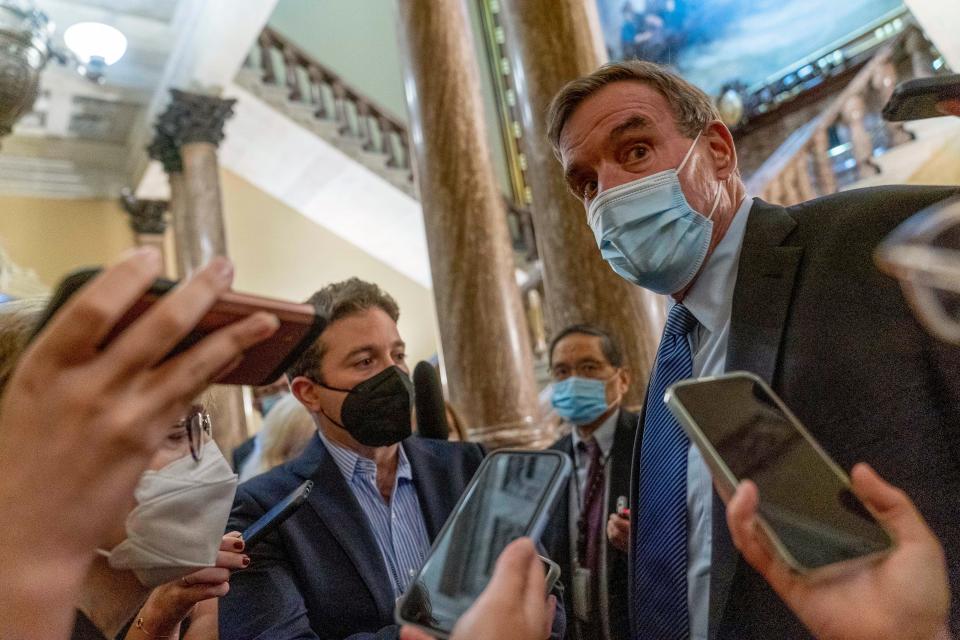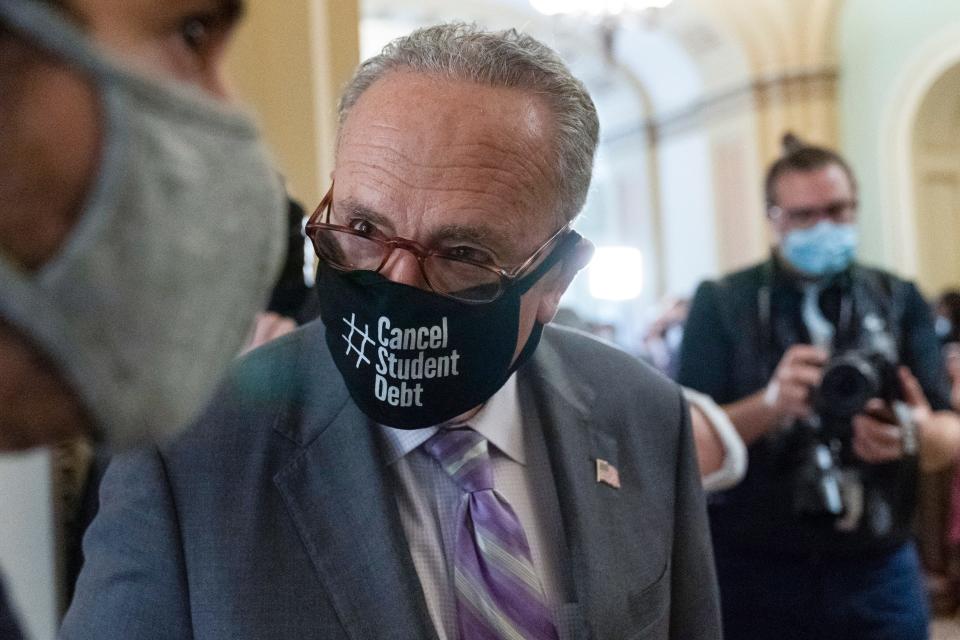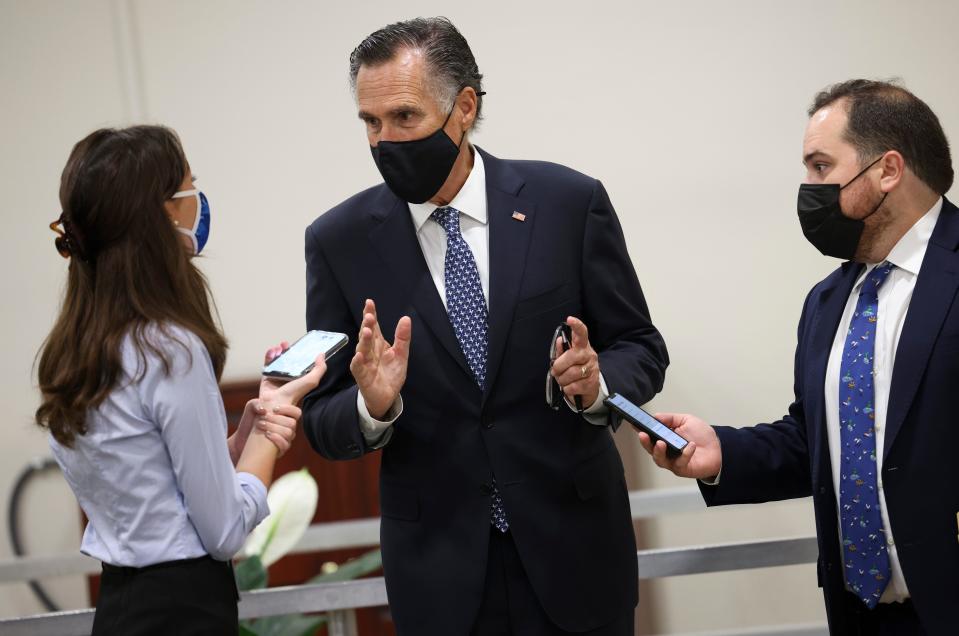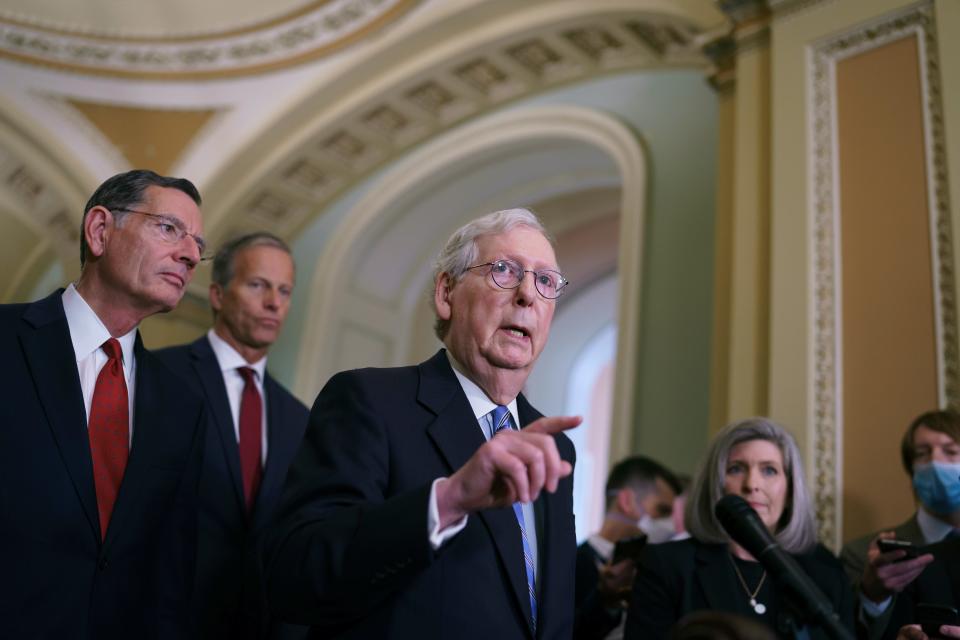Democrats face tough options for raising debt ceiling as US inches closer to Oct. 18 deadline
- Oops!Something went wrong.Please try again later.
WASHINGTON – Time is running out for Congress to increase the country’s debt limit and avoid economic chaos, but Senate Democrats face a challenging menu of options to raise the borrowing limit and avoid economic chaos.
Senate Republicans were expected to block another Democratic attempt to raise the nation's debt ceiling on Wednesday, but the vote was postponed. If that vote fails, it would force Democrats to consider alternatives they've resisted, including a controversial step to bend Senate rules to allow the bill to come to a final vote.
The clock is ticking. Treasury Secretary Janet Yellen warned the country will exhaust its borrowing authority by Oct. 18. If the country defaults, Moody’s Analytics estimated, it could wipe out 6 million jobs and $15 trillion in household wealth.
If Republicans block efforts to raise the debt ceiling, they leave Democrats with three options to get a vote: Recruit 10 Republicans to join them; change Senate rules to prevent Republicans from blocking the vote; or pursue the route Republicans want them to take: Pass the bill by themselves using a maneuver called reconciliation that could lead to lengthy debates.
Republicans have remained united in opposition to a straight vote on the legislation, saying Democrats should pass it themselves since they control the White House and both chambers of Congress. Democratic leaders have refused to pursue reconciliation, which they argue would lead to a debate with unlimited amendments and would be cumbersome and time-consuming.
Otherwise, Democrats would need to unite behind a new interpretation of the rules to undo the legislative hurdle known as the filibuster, but several Democrats have voiced objections to this option. Convincing 10 Republicans to join them in overcoming the filibuster has been fruitless.
The impasse leaves uncertain how the Senate will avoid an economic catastrophe if the country defaults on its debt with a deadline less than two weeks away.
"Quite frankly, there's not many options," President Joe Biden said Tuesday.
Sen. Mark Warner, D-Va., noted that credit agencies began downgrading the country’s credit in 2011 with the same time left to the deadline as now.
“We're in the danger zone right now,” Warner said.

Republicans remain opposed to helping Democrats
Republicans acknowledge the need to raise the debt limit, but they contend that since Democrats are debating a reckless spree of taxing and spending, including Biden's $3.5 trillion package of social welfare programs, without Republican votes, they can approve the debt limit on their own, too. The opposition extends even to allowing a vote on the debt ceiling legislation.
The Senate postponed a vote Wednesday on whether to limit debate on legislation that would suspend the debt limit until Dec. 16, 2022. The vote was expected to come up short of the 60-vote threshold needed to overcome a Republican filibuster because of GOP objections.
Senate Minority Leader Mitch McConnell, R-Ky., offered to allow a short-term extension of the debt limit into December. McConnell said the extension should include a precise dollar figure rather than an unspecified extension, while Democrats negotiated a longer-term extension.
Senate Democrats said they wanted to study the proposal, but most dismissed it.
“It's pure politics," said Sen. Patrick Leahy, D-Vt. "It's stupid. It's wrong to not just vote up or down."
McConnell has remained steadfast since announcing in July his opposition to helping Democrats raise the debt limit.
"They have squandered week after week after week," McConnell said. "It's not clear whether the Democratic leaders have wasted two and a half months because they simply cannot govern or whether they are intentionally playing Russian roulette with the economy to try to bully their own members into going back on their own word and wrecking the Senate."
Why does the federal debt limit matter? Here's what America's debt actually looks like
Senate Republicans objected Sept. 28 to Senate Majority Leader Chuck Schumer, D-N.Y., bringing up a similar bill. And they blocked debate Sept. 27 on legislation that would provide temporary government funding and raise the debt limit.
The Republican position could have looked different if the eventual increase in the debt limit were in doubt, according to political experts.
“If the Republicans in the Senate were in some sense ultimately pivotal in deciding whether the United States should default on its debt or not, then the optics wouldn’t matter as much as the policy,” said Sanford Gordon, a politics professor at New York University. “If they can get the policy benefit without incurring the political cost, it seems to me politically that’s what they’re going to do.”

GOP needed to break filibuster
One option for Democrats would be to persuade 10 Republicans to join them in allowing a vote to raise the debt limit, which is unlikely.
"They are frantically asking our side for shortcuts," McConnell said.
Because Republicans object to how Democrats debate the debt limit, they can block a vote through unlimited debate called a filibuster. Overcoming a filibuster would require a 60-vote majority in the chamber, which has 50 Republicans and 50 members of the Democratic Caucus.
Even Republicans who sometimes cross the aisle have stuck together.
“I think Republicans have made it very clear, every single one, that we're not voting to raise the debt ceiling,” Sen. Mitt Romney, R-Utah, said Sept. 29. “Leader Schumer has the capacity to raise the debt ceiling with Democrats alone. Go ahead and do it.”

Potentially changing the filibuster
Another option would be to change the interpretation of rules governing the filibuster. Senate Democrats eliminated the supermajority threshold to confirm judicial and executive nominations in 2013.
“Oh, I think that’s a real possibility,” Biden, who served 36 years in the Senate, said Tuesday.
Sen. Chris Van Hollen, D-Md., said Wednesday that he supports carving out an exception to the filibuster to allow consideration of raising the debt limit.
“My view is that if the Republicans don’t get out of the way on their own, we should have a carve-out on this issue,” Van Hollen said. “A carve-out always depends on whether the votes are there.”
Lawmakers from both parties have resisted ending the filibuster for legislation because it effectively requires bipartisan support or consultation on most measures.
Two Democrats – Sens. Joe Manchin of West Virginia and Kyrsten Sinema of Arizona – oppose ending the filibuster.
Manchin said Wednesday he hasn't changed his mind.
"I think I've been very clear," Manchin said. "Nothing changes."

McConnell suggests Democrats use reconciliation
One way to avoid a filibuster in the Senate is through reconciliation. The challenge is that budget legislation is open to amendments, which typically generates hundreds of proposed changes and requires dozens of votes on the Senate floor, nicknamed a vote-a-rama.
McConnell outlined the strategy on the Senate floor and argued Democrats have had months to pursue it. He said Wednesday that Republicans might agree to time limits on amendments.
“Our colleagues have plenty of time to get it done before the earliest projected deadline,” McConnell said. “There would be potential for time agreements to wrap it up well before any danger.”
Biden and Schumer have been reluctant to pursue that course because of the length and uncertainty of the amendment process.
“It’s fraught with all kinds of potential danger for a miscalculation,” Biden said Monday. “It’s an incredibly complicated, cumbersome process, when there’s a very simple process sitting out there.”
Reconciliation would require Democrats to put a precise figure on how much the debt would rise. The bill Republicans blocked Sept. 29 would have suspended the debt limit until December 2022. Schumer estimated the debt would rise about $900 billion during that period.
“We do not have the luxury of using a drawn-out, convoluted and risky process,” Schumer said Tuesday. “We could prevent a catastrophic default with a simple majority vote (Wednesday) if Republicans will just get out of the damn way."

Tensions rise as impasse continues
The impasse over something everyone agrees must happen sparked frustration on all sides.
The U.S. Chamber of Commerce, the Business Roundtable and the Small Business Roundtable urged Congress to put aside political disputes and approve the debt limit. Biden invited leaders representing banks, real estate and the elderly to the White House on Wednesday to push for an increase in the debt limit.
“I think the real danger is the more politicized the debt limit becomes, as happened under both Democrats and Republicans, the more dangerous the situation gets," Neil Bradley, executive vice president and chief policy officer at the U.S. Chamber of Commerce, said Tuesday on C-Span.
Business Roundtable CEO Joshua Bolten said Sept. 28 that it's unacceptable to risk default.
“It’s nuts that we go through this brinksmanship every few years that really threatens the full faith and credit of the United States and poses a great risk to the economy," he said.
Sen. Ted Cruz, R-Texas, said there wouldn’t be a default, but Biden and Schumer talking about a default are practicing gamesmanship and brinksmanship. Cruz said Biden, Schumer and House Speaker Nancy Pelosi, D-Calif., know reconciliation is how the limit will be increased.
“All of the rest of this is political games because they want to posture,” Cruz said Tuesday. “The reason he wants to play these games is (Schumer) wants to avoid responsibility.”
Brian Bethune, a part-time economics professor at Boston College, said each side wields the issue for political leverage.
"It’s a game of chicken because everyone knows it has to be passed at some point," Bethune said. "It’s very treacherous to go down that path knowing that mechanically it has to be approved."

This article originally appeared on USA TODAY: Debt ceiling: Senate Democrats face tough choices to raise debt limit

